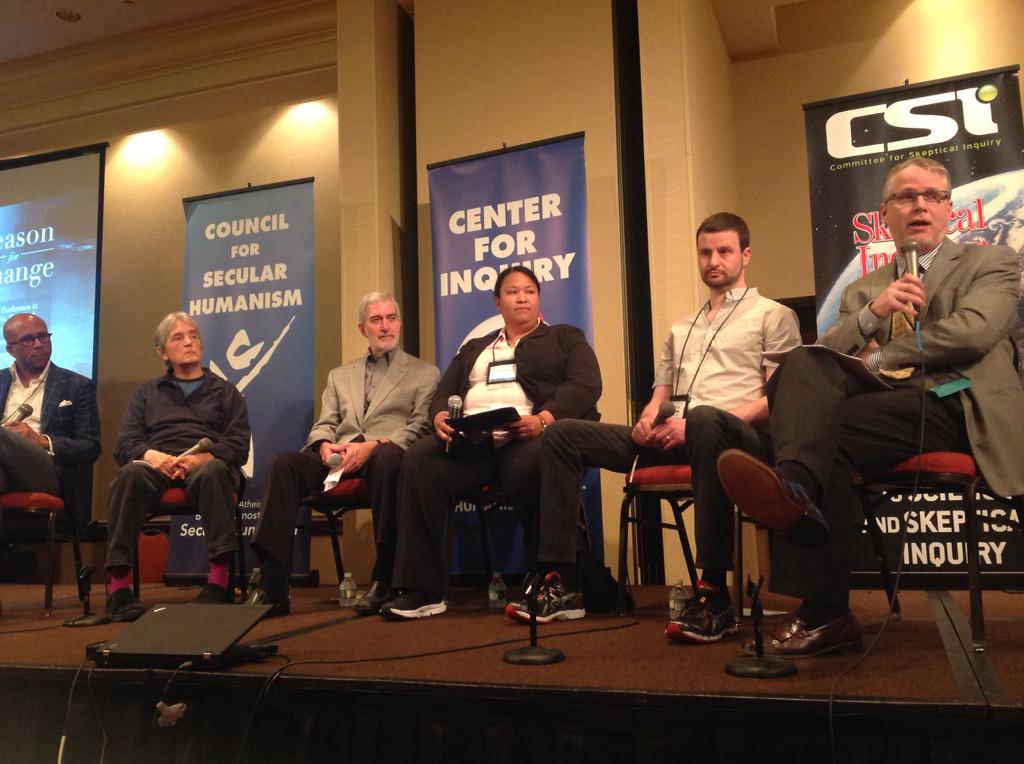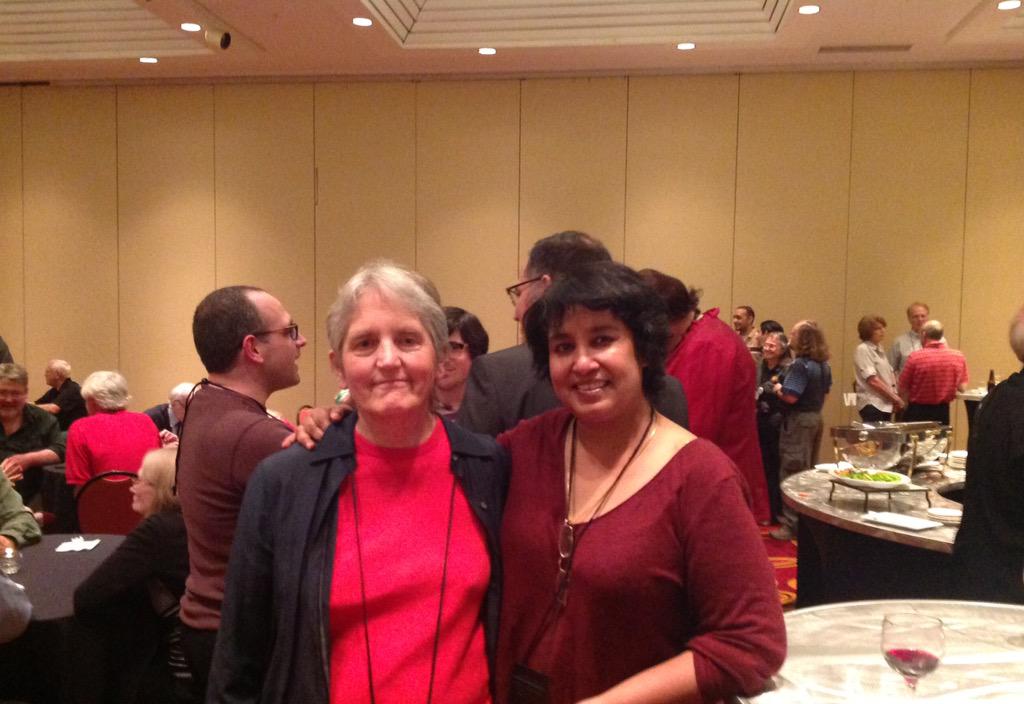Sophie Elmhirst has a long profile of Richard Dawkins in the Guardian. It’s partly about his new career of creating uproars on Twitter, and whether or not that’s a good idea.
The two strands of Dawkins’s mission – promoting science, demolishing religion – are intended to be complementary. “If they are antagonistic to each other, that would be regrettable,” he said, “but I don’t see why they should be.” But antagonism is part of Dawkins’s daily life. “I suppose some of the passions that I show are more appropriate to a young man than somebody of my age.” Since his arrival on Twitter in 2008, his public pronouncements have become more combative – and, at times, flamboyantly irritable: “How dare you force your dopey unsubstantiated superstitions on innocent children too young to resist?,” he tweeted last June. “How DARE you?”
“Flamboyantly irritable” is a good way of putting it. There are problems with both, especially in a famous Oxford academic – and especially when they are irritable rather than witty or probing. Anybody can do irritable, and anybody does; it’s hard to see why Dawkins needs to join that massive and uninteresting crowd.
These days, Dawkins describes himself as “a communicator”. But depending on your point of view, he is also a hero, a heathen, or a liability. Many of his recent statements – on subjects ranging from the lack of Nobel prize-winning Muslim scientists to the “immorality” of failing to abort a foetus with Down’s syndrome – have sparked outraged responses (some of which Dawkins read aloud on a recent YouTube video, which perhaps won him back a few friends). For some, his controversial positions have started to undermine both his reputation as a scientist and his own anti-religious crusade. Friends who vigorously defend both his cause and his character worry that Dawkins might be at risk of self-sabotage. “He could be seriously damaging his long-term legacy,” the philosopher Daniel Dennett said of Dawkins’s public skirmishes. It is a legacy, Dennett believes, that should reflect the “masterpiece” that was The Selfish Gene and Dawkins’s major contribution to our understanding of life. As for Twitter: “I wish he wouldn’t do it,” Krauss said. “I told him that.”
Lots of people have told him that – friends and colleagues, I mean, not just onlookers.
Dawkins regularly goes on fundraising lecture tours, where his fame comes in useful. Tickets for a tour of the US in June – “an evening with Richard Dawkins”, in theatres in Portland, Oregon, Rochester, Minnesota and Boston – are on sale on the RDFRS website for $35. Access to a VIP reception beforehand is $250. Membership of the “Dawkins circle” costs from $1,000 to $9,999 a year, winning you discounts to the foundation’s online store, invitations to events with “RDFRS personalities” and, at its most expensive, two tickets for an “invitation-only” event with Dawkins himself. The fundraising is led by Robyn Blumner, the full time CEO of his foundation; Dawkins is her celebrity draw. “I’m totally hopeless at asking for money,” said Dawkins. “So I do work extremely hard at trying to be charming.”
Twitter not included.
For Dawkins, the science has always come first; his atheism is simply a natural extension of a lifelong quest to do Darwin’s work on Earth. As for the suggestion his public interventions over the past few years have done more harm than good – both to himself and his cause: “That does worry me,” Dawkins conceded, and yet he cannot quite resist the urge to wade in. “I think there is a curious desire in humans, maybe not all humans but certainly in me, to put things right,” he said. “There’s a joke in the New Yorker or something like that, of a man at a computer. It’s obviously very late and his wife is begging him to come to bed. He’s saying, ‘I can’t come to bed. Somebody’s wrong on the internet.’”
Twitter is not the best medium for putting things right. It’s one of the worst.
In recent years, the following sequence of events has become something of an online soap, regular and predictable: Dawkins tweets, is criticised for being deeply offensive, and then writes a long article to explain what he actually meant, which usually is not too far from what he said in the first place, but expressed with slightly more nuance. Since Dawkins joined Twitter seven years ago, he has amassed more than a million followers. He tweets assiduously, attracted by the medium’s limitations: “I’m sort of mildly intrigued by the art form of précising something into 140 characters; it’s not an easy thing to do. And there’s a certain satisfaction in the skill of doing it.”
Avoiding the obvious joke, I will make the less obvious point that the satisfaction fades pretty quickly, or at least it did in my case and I think probably in most people’s. You get the hang of it and then it just becomes a tool – it can be good for rapid conversations if the participants are witty enough, but no one tweet is likely to be a work of art. I think the medium’s limitations are something Dawkins shouldn’t be attracted by – I think they don’t work in his favor.
There was the pot of honey, for instance, as Elmhirst goes on to say.
Even on more serious topics, Dawkins cannot quite fathom how often he finds himself at the centre of online firestorms. “I do seem to be horribly susceptible to being misunderstood,” he said.
And why is that? If it’s a pattern, there’s probably a reason for the pattern. I think I know what it is.
“Quite a lot of what I do on Twitter is try to raise a discussion point,” he said. “It’s as though I was doing a seminar with students and said, ‘Here’s an interesting thought, X. What do you think about X?’” He is then mystified when his hypothesis is met by a chorus of criticism and abuse. “Very often I’m not making a point, but asking a question.” Sometimes his questions seem genuinely curious: “Whistling requires precise tongue positioning, like finger on violin string. Yet most can whistle tunes sans training. Interesting?” But often they are more rhetorical: “Truly? Is Sweden such a fatuously ridiculous country, bending over backwards to accommodate religious idiocy?”
Now I’m picturing fatuously ridiculous Sweden bending over backwards, and snickering.
Last July, Dawkins wrote, in 136 quickly infamous characters, “Date rape is bad. Stranger rape at knifepoint is worse. If you think that’s an endorsement of date rape, go away and learn how to think.” For Dawkins, this was simply the illustration of a basic point of logic; on the other hand, he was using a highly sensitive crime as an example. “If I used another example it would have been obvious,” Dawkins said, by way of explanation. “The point is there are people who seriously refuse to admit that some rapes are worse than others.” Isn’t that a judgment to be made by the person who’s experienced it? “Exactly, which is why I said date rape may be worse than stranger rape. I said that. It’s up to the victim to decide … But it’s absurd for the thought police to come along and say that it is forbidden to allow a woman to rank some rapes as worse than others … This is a logical point, and there are people who say that emotion trumps logic.” For Dawkins, the idea that someone could understand his argument and still disagree with him was bewildering. “There must be something wrong with how I’m expressing it,” he said. In the presence of his logic, there is no room for an alternative view.
When did he write that? Right after we issued the joint statement. Two days after, if I remember correctly.
Perhaps the greatest source of disquiet within the atheist movement – particularly in the US, where the movement, under the broad banner of “skepticism”, is more active and organised – is among feminists. Greta Christina, an American feminist and atheist blogger, first met Dawkins at an event in 2009. It was a fantasy made real. “He was the reason I started calling myself an atheist … [meeting him] was one of the proudest moments of my life.” Then, in 2011, Dawkins waded into a comment thread under a blogpost about a discussion of sexual harassment that had recently taken place at a skeptics’ conference in the US: “Dear Muslima,” Dawkins wrote to an imagined Muslim woman, “Stop whining, will you. Yes, yes, I know you had your genitals mutilated with a razor blade, and … yawn … don’t tell me yet again, I know you aren’t allowed to drive a car … But stop whining, will you. Think of the suffering your poor American sisters have to put up with.”
The attempt at satire went down badly: Dawkins appeared to be dismissing any concerns about sexual harassment (“He spoke some words to her. Just words,”) and doing so by ranking the experiences of women. He later apologised, but it marked, for Christina, a “disappointing and discouraging” turn for Dawkins, who had become, in her eyes, “so troubling, in such serious ways, and in particular so stubbornly troubling”.
Dawkins has always called himself a “passionate” feminist. As a fellow at New College, he agitated to allow women to be admitted, a change that occurred in 1979. “I show my feminism very largely in the Islamic context,” he said. “Because if women are having a hard time anywhere in the world, it’s there … I get impatient with American feminists who are so obsessed with being looked at inappropriately over the water cooler at work or whatever it is, that they forget that there are women being literally stoned to death for the crime of being raped.”
No, we don’t. We don’t forget. I, for instance, write about both. A lot.
His position has been interpreted in unfortunate ways by some of his followers. “Because he’s such a hero in the movement,” the American feminist Ophelia Benson said, “that gave a green light to an awful lot of people in the movement who thought it was okay to harass [feminists].” In recent years, online sceptic forums have been deluged with bilious anti-feminist posts and crude photoshopped images of women.
In an attempt to quell the increasingly unpleasant tone of discussion, Dawkins released a statement last August, jointly written with Benson, calling for an end to the online abuse. Dawkins added a personal footnote: “I’m told that some people think I tacitly endorse such things even if I don’t indulge in them. Needless to say, I’m horrified by that suggestion. Any person who tries to intimidate members of our community with threats or harassment is in no way my ally and is only weakening the atheist movement.”
A few weeks later he was back on Twitter writing comments about how a drunk woman’s evidence was unreliable in a rape trial. Why? “Because I not only care passionately about truth, I care passionately about justice.” (Should it not worry him more that such a tiny proportion of rape cases make it to court at all? “Oh absolutely … I care very passionately about that, of course I do.”) Benson, who had encouraged Dawkins to write the statement in the first place, looked on in despair. “No, no, Richard,” she remembered thinking. “That was not the idea.”
Yup. That is what I thought.
But don’t worry: the balance sheet comes out right.
“Ultimately, will his net impact be positive?” Krauss asked. “I think the answer’s yes. For all the intelligentsia and all the people who are offended, I see a much larger audience that I hadn’t appreciated for whom these issues are brand new.”
Again, I will avoid the obvious retorts. I’m tired of uttering them.
(This is a syndicated post. Read the original at FreeThoughtBlogs.)






